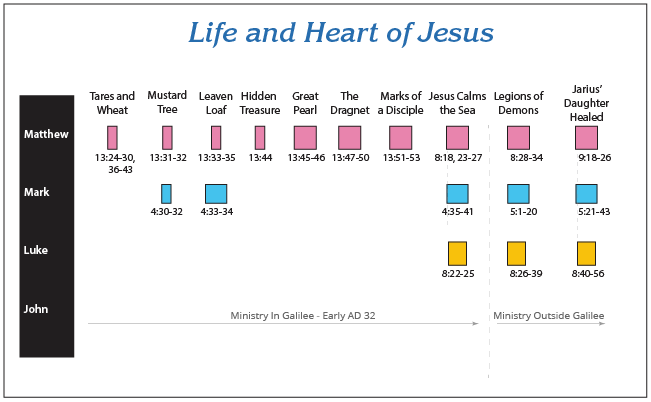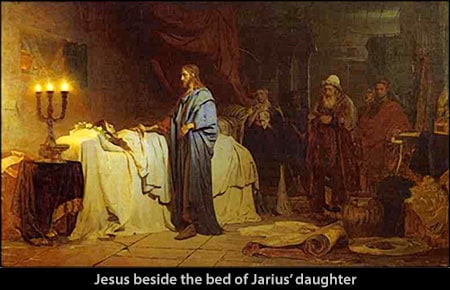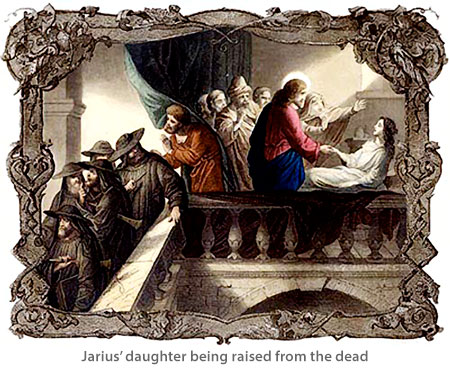Some years ago a man was attempting to find a new job because his company was moving to another city about 500 miles (805 km) away. The man did not want to relocate. So he contacted a number of potential employers in an attempt to remain in his city. He was willing to relocate if his current employer would give him a promotion, but the company did not make that offer. So he was repeatedly asking God for the promotion or another job. As the days turned into months, nothing happened. He began to be discouraged, and finally one morning as he was traveling to work, he told God that he would stop fighting and stop seeking the promotion and relocate. He believed that was God’s desire since no job offers had been received. He was filled with emotion, disappointment, and had a deep sense of personal sacrifice. When he arrived at work that morning, he told his supervisor that he would relocate. Then late in the morning, he received an unexpected telephone call. After he picked up the telephone, a familiar voice greeted him and offered him the promotion for which he had been praying. When the conversation was over, he thanked God for the promotion. God had tested him. God had waited for him to yield finally and be willing to do whatever God desired for him. When the man was finally willing to yield and submit, God granted the desire of his heart. This study is about another man who had to yield finally and submit.
Background
While this study (Matthew 9:18-26; Mark 5:21-43; Luke 8:40-56) is about the resurrection of a man’s daughter and the healing of a woman who was bleeding, it is also about a man who must have been frustrated when it appeared that Jesus did not care. The events in this study occurred after Jesus and the disciples left the region known as the Decopolis and returned to Galilee. Earlier Jesus had escaped the crowd in Galilee by sailing to the region known as the Decopolis. It was there that Jesus expelled a legion of demons from two men. It was there that 2,000 pigs ran into the Sea of Galilee and were drowned. It was there that the people asked Jesus to leave and so He did. When Jesus returned to Galilee, the crowd quickly found Him.
When Jesus had crossed over again in the boat to the other side, a large crowd gathered around Him; and so He stayed by the seashore. Mark 5:21 (NASB)
The gospel of Luke tells us the reason they found Jesus so rapidly was that they had been waiting for Him (Luke 8:40). No matter where Jesus went in Galilee there were crowds. Crowds, crowds, and more crowds. Crowds everywhere were looking for Him. This particular crowd was large. When the people saw Him, they surrounded Him. So He lingered for awhile on the seashore. While He was speaking to the people, a synagogue official named Jairus found Him. As a synagogue official, he would have been very prominent in the community. He would have been a layman with responsibilities to direct the worship services in the synagogue. But when he saw Jesus, he did not act like a proud man. Instead, he humbled himself.
One of the synagogue officials named Jairus came up, and on seeing Him, fell at His feet and implored Him earnestly, saying, “My little daughter is at the point of death; please come and lay Your hands on her, so that she will get well and live.” Mark 5:22-23 (NASB)
Not only did the synagogue official kneel and bow, but Luke 8:41 tells us that he started imploring, or begging, Jesus to come to his home and heal his daughter. The man was serious and eager for Jesus to come. He was desperate. His daughter was twelve years of age, and she was his only child (Luke 8:42). The gospels clearly indicate that Jairus deeply loved her. Just imagine the crowd watching one of their synagogue leaders kneeling and begging. That would have been impressive for anyone to watch. If he was loved by the people, they would have felt great compassion for him.

Conflict With Matthew?
Matthew 9:18 appears to give us a different version of Jairus’ statement to Jesus, since it implies that Jairus’ daughter was already dead.
While He was saying these things to them, a synagogue official came and bowed down before Him, and said, “My daughter has just died; but come and lay Your hand on her, and she will live.” Matthew 9:18 (NASB)
But a better rendering of the Greek reveals that Jairus said she was near the end of her life, and not necessarily dead. That is, she was in the last stage of her life. Jairus believed she was very close to death and time was urgent. Jesus needed to come quickly and not delay.
Jesus Follows
So Jesus got up from the ground and started following the synagogue leader to his home. But the crowd followed too!
Jesus got up and began to follow him, and so did His disciples. Matthew 9:19 (NASB)
And He went off with him; and a large crowd was following Him and pressing in on Him. Mark 5:24 (NASB)
The crowd was so eager to talk with Him that they pressed against Him as they walked. The Greek word for “pressing” has the idea that the people were pressing in from all sides. It must have been difficult to walk with people bumping and maybe some pushing others so that they could walk next to Jesus. What a picture!
Jairus’ eagerness for Jesus to reach his daughter must have caused him some anguish as the crowd slowed their progress. But Jairus did not know and could not have expected that Jesus was about to stop and take care of someone else first. His daughter would have to wait. Jairus’ patience would be tested and his desire would soon be frustrated.
Neither Jesus, the disciples, nor Jairus knew that a woman who had a twelve year hemorrhage was about to interrupt their trip. They did not know that she was moving her way through the crowd.
A woman who had had a hemorrhage for twelve years, and had endured much at the hands of many physicians, and had spent all that she had and was not helped at all, but rather had grown worse— after hearing about Jesus, she came up in the crowd behind Him and touched His cloak. For she thought, “If I just touch His garments, I will get well.” Mark 5:25-27 (NASB)
This sick woman was now poor. She had not always been poor. She had given all of her money to the ancient physicians who did not know how to heal her. They had made promises that they did not keep. We are told that she suffered “much” from these “physicians” only to get worse and not better. This woman had been abused and robbed in the process. (A dear friend of mine once advised me that fifty percent of all doctors graduate in the last half of their class! He was having fun with his comment, but yet his statement is true.) None of the doctors of that day could help this woman.
Therefore, she came after Jesus. We are told that she “came up” through the crowd. Since the crowd was pressing against Jesus, she must have brushed by others in order to get through the crowd. When she reached Jesus, she touched the edge of His cloak. Luke 8:44 says that she touched the “fringe” of his cloak. This may refer to the tassels on his cloak if it had tassels. She was trying to avoid attention. She came up from behind and leaned over or kneeled down in order to touch the edge of His cloak. She did not attempt to speak with Him. In fact, we see shortly that she probably did not want to talk with Him.
For she thought, “If I just touch His garments, I will get well.” Immediately the flow of her blood was dried up; and she felt in her body that she was healed of her affliction. Mark 5:28-29 (NASB)
Immediately the woman was healed. Jesus was and is the Healer of healers. He is the Doctor of doctors. If you do not mind, let me say that Jesus “graduated at the top of His class.” He is the God of the universe. She believed, and immediately she was healed.
Immediately Jesus, perceiving in Himself that the power proceeding from Him had gone forth, turned around in the crowd and said, “Who touched My garments?” Mark 5:30 (NASB)

The Interruption
Immediately Jesus knew that power had left Him. Someone had been healed. Mark 5:30 and Luke 5:17 are unique verses in the gospels because only these two verses reveal that when Jesus healed, power flowed from Jesus. As soon as Jesus knew that power had flowed from Him, He stopped, turned, and asked, “Who touched My garments?” Wow! The woman must have been stunned and fearful, and Jairus must have been anxious. Jesus is thinking about, “Who touched Me?” and Jairus is thinking about his dying daughter. Jairus must have thought, “Doesn’t Jesus understand that my daughter is about to die?” Jairus wanted something else. He must have been like the man who did not want to relocate. But Jesus stopped and asked what appeared to Jairus to be an unimportant question.
The disciples had a different thought.
And His disciples said to Him, “You see the crowd pressing in on You, and You say, ‘Who touched Me?'” Mark 5:31 (NASB)
The disciples seemed to have good perspective. It sure seemed stupid to ask, “Who touched Me?” with all the people pressing upon Him from every direction. The Greek implies that the disciples were repeatedly asking this question as Jesus looked for the woman.
And He looked around to see the woman who had done this. Mark. 5:32 (NASB)
The fearful woman was not eager to reveal herself, but finally she did.
But the woman fearing and trembling, aware of what had happened to her, came and fell down before Him and told Him the whole truth Mark 5:33 (NASB)
When she came forward, she fell down at Jesus’ feet and explained why she touched His cloak. While we are told what she said, it is clear from Jewish law that she was not supposed to touch another person while she had a flow of blood (Leviticus 15:25-33). The Mosaic law said that a woman with a flow of blood was unclean while the flow continued. She was not allowed to attend the temple worship or participate in social life. No one could touch her, and she could not touch anyone. Seven days after the flow of blood stopped and after she offered a sacrifice of two pigeons, she could return to normal life. This poor woman had been an outcast, or unclean, for twelve years! Yet, she had touched Jesus’ garment in violation of the law. Therefore, she had good reason to be fearful. She had violated the law, and according to Jewish custom made Jesus unclean. She had also given the appearance of showing disrespect for Him. She must have been in great emotional anguish, fearing rejection. She might have been afraid that Jesus would undo the healing.
And He said to her, “Daughter, your faith has made you well; go in peace and be healed of your affliction.” Mark 5:34 (NASB)
But Jesus forgave her and finally told her that her faith had made her well and that she was free to leave.
This passage clearly teaches that she was healed because of her faith. It is obvious that her faith motivated her to push her way through the crowd and touch Jesus. She had faith in Jesus. But it is an error to assume that all healing requires faith. For example, the resurrection of the widow of Nain’s son did not require faith, since her son was dead. Dead people do not have faith.
The Bad News
How did Jairus feel while Jesus stopped, looked around, waited for the woman to come forward, and then spoke with her? How did he feel as the minutes passed one by one as Jesus and the woman talked? How did he feel when someone from his house came with the following report,
While He was still speaking, they came from the house of the synagogue official, saying, “Your daughter has died; why trouble the Teacher anymore?” Mark 5:35 (NASB)
The message must have been one of pain. His daughter was now dead. His wish for healing now seemed pointless, and his desire that Jesus would hurry was frustrated. I imagine he was grieving already with a flashing thought of disappointment that Jesus had delayed. Did he have a moment of anger? I am sure that the messenger’s suggestion that Jesus was no longer needed seemed logical. But it was also a reminder that Jesus had not hurried to help. The comment also revealed the messenger’s lack of faith and lack of understanding that Jesus was God.
Jesus heard the report and responded.
But when Jesus heard this, He answered him, “Do not be afraid any longer; only believe, and she will be made well.” Luke 8:50 (NASB)
Jesus encouraged Jairus to believe. Those were the words that Jairus needed to hear. Jairus had believed enough to seek Jesus, to ask Him to lay hands on his daughter, but his faith was weak. He had not realized that Jesus could also raise the dead. He had believed that Jesus could heal if she was alive, but he could not imagine that He might be able to help her when she was dead. His view of Jesus was very small. We, today, have the same problem on occasions.

They Laughed
How long did take them to arrive at Jairus’ home? We do not know and we do not really care since she was already dead. When they arrived at the home, Jesus allowed only three of His disciples to enter the home.
And He allowed no one to accompany Him, except Peter and James and John the brother of James. They came to the house of the synagogue official; and He saw a commotion, and people loudly weeping and wailing. Mark 5:37-38 (NASB)
Mourners were already wailing and weeping outside the home. The message had already spread in the community. Now the crowd of people was even larger. Jesus did not stop to speak, but immediately entered Jairus’ home.
And entering in, He said to them, “Why make a commotion and weep? The child has not died, but is asleep.” They began laughing at Him. Mark 5:39-40a (NASB)
Inside Jesus attempted to encourage them, but they laughed and jeered at Him. Did His three disciples laugh? Did Jairus and his wife laugh? It appears that it was the other people inside the home who laughed. So Jesus entered the girl’s room and did not allow anyone else to enter, except the three disciples and the girl’s parents.
But putting them all out, He took along the child’s father and mother and His own companions, and entered the room where the child was. Taking the child by the hand, He said to her, “Talitha kum!” (which translated means, “Little girl, I say to you, get up!”). Immediately the girl got up and began to walk, for she was twelve years old. And immediately they were completely astounded. Mark 5:40b-4 (NASB)
Then He took the young girl’s hand and ordered her to get up. The gospel of Luke says her spirit returned.
And her spirit returned . . . Luke 8:55a (NASB)
The girl got out of bed and started walking. Everyone was amazed at what they saw, especially her parents (Luke 8:56). Then Jesus asked her parents to give her something to eat after He ordered them not to talk about the nature of the healing.
And He gave them strict orders that no one should know about this, and He said that something should be given her to eat. Mark 5:43 (NASB)

Conclusion
Jairus discovered an important truth. He discovered that God does not ignore our requests. He is not deaf. He does not sleep nor slumber. In fact, He knows all about your prayer before you even ask. Yet, delays are part of God’s plan. Often we must wait for an answer.
Yes, sometimes His answer is, “No!” He will often care for others while He is caring for us. Sometimes He must alter circumstances to answer our prayers. Sometimes He waits for us to yield or submit. That was the experience of the man who did not want to move to relocate with his employer. God will wait for us to stop making demands. He will wait until we are willing to do whatever He wants. Sometimes He will wait until we have given up and everything seems dark and lost, just as Jairus experienced. Then He will respond when the only thing left is to trust in Him. Then you might hear the words, “Only believe!” He seeks our submission and dependence upon Himself.